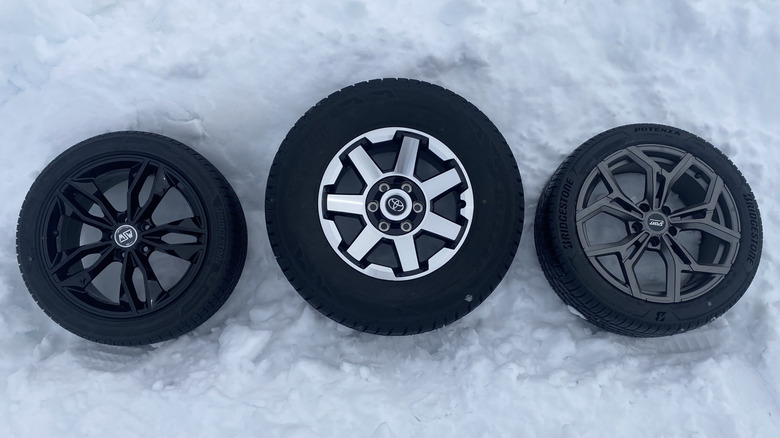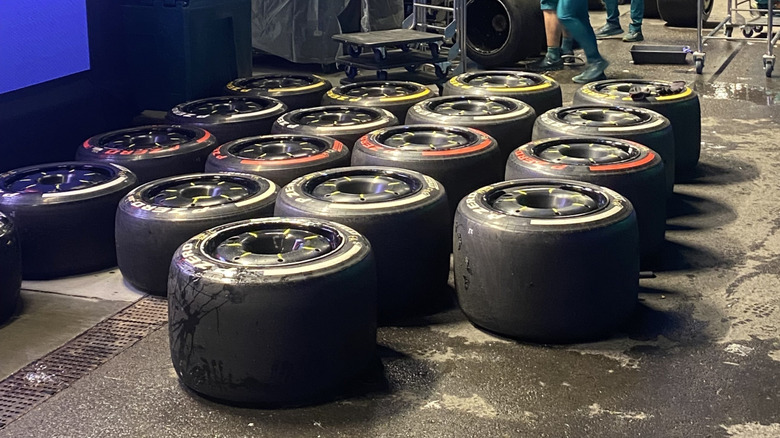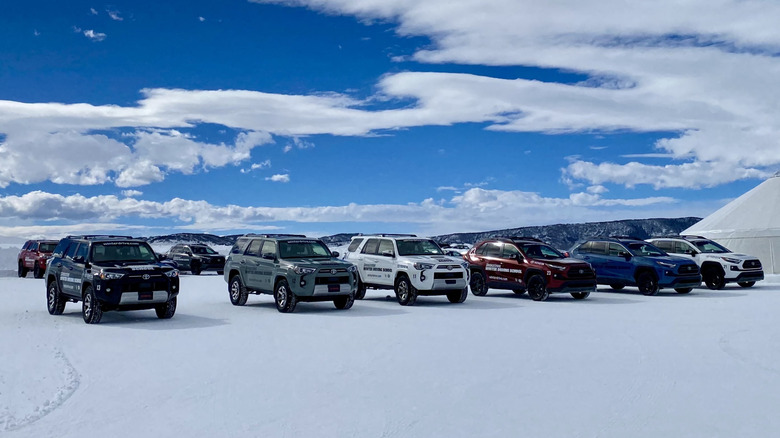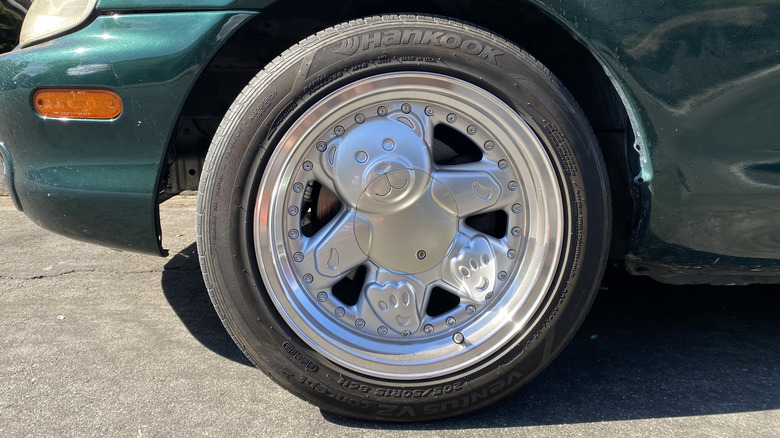Life is full of compromises. Sure, you could buy the four-in-one combination shampoo, conditioner, body wash, and toothpaste, but deep down you know that dedicated shampoos, conditioners, body washes, and toothpastes will do their respective jobs better. You have to compromise the efficacy of purpose-built products for the convenience of an all-in-one magic pill that makes life simpler.
This applies to the automotive world too, where everything is about compromise. You can have the highest performance car ever, but you sacrifice daily drivability and affordability; or you could have the most practical minivan ever, but you sacrifice style, driving dynamics, and panache. Tires are no different — regardless of what kind of vehicle you drive and whether your car is front-wheel drive, rear-wheel drive, all-wheel drive, or four-wheel drive.
There are several different considerations to take into account when shopping for tires, and your specific needs will vary based on how you use your car, where you live, how much you drive, and your budget.
Differences between tire types
Every type of tire contributes to a very different driving experience: Summer tires provide exceptional performance and grip in temperate conditions, but don’t have particularly long treadwear — and, much like me, they break down in cold temperatures. The opposite goes for winter tires which offer brilliant traction in cold temperatures and inclement weather, but they break down fast in warm temperatures and aren’t good for sporty driving in dry conditions.
All-season tires are the four-in-one shampoo, conditioner, body wash, and toothpaste of the tire world. They offer a convenient middle ground that combines reasonable traction in most road conditions, but they don’t offer the same performance as summer or winter tires in extreme conditions. I experienced these conditions first-hand at the Bridgestone Winter Driving School last year, which you can read about here.
Here are some general pros and cons of all-season tires to help you make an informed purchase when replacing tires on your vehicle.
Let’s start on a positive note for all-seasons
All-season tires are a good option for most drivers in most conditions, and that’s why they’re the most common type of tire on new cars. In our fast-paced capitalist society, very few people have the time, desire, and/or the mental capacity to switch their vehicle’s tires every time the season changes. Consumer Reports’ tire program manager Ryan Pszczolkowski calls modern all-season tires “the Swiss Army knife of tires … they provide good year-round grip for most consumers including modest winter and snow traction.”
If you own one car and live somewhere with volatile weather conditions, or you crave simplicity, then all-season tires might be the best option for you. Traction is the most important safety consideration when buying new tires. If you have good traction, your car will stop in a shorter distance, grip better to safely swerve around hazards, and allow you to maintain control of your vehicle.
All-season tires provide good traction in the summer, they’re good at evacuating water for wet-weather traction, and the rubber compound is designed to retain traction and longevity in relatively low temperatures. The majority of all-season tires also offer low rolling-resistance and high treadwear ratings, which means they are designed to maximize your car’s fuel efficiency and last for several thousands of miles. So what’s the catch?
Compromises you make with all-season tires
The most dangerous situation that most all-season tires don’t account for is extreme cold, and the weather conditions that come with it. Generally speaking, it’s recommended to keep most all-season tires warmer than 45-degrees Fahrenheit. Below that temperature, the rubber that an all-season tire is made of can harden, which will cause you to have less control of your car — increasing the distance it takes for your car to stop. Winter tires are made of a rubber that’s specially formulated to retain their grip, even in extremely low temperatures.
Beyond the negative impact of cold temperatures, snowy, icy, and slushy conditions will also expose the limitations of all-season tires. The tread pattern on most all-season tires is not designed to handle the unique challenges posed by snow, ice, and slush. Dedicated winter tires have specially designed tread patterns that make them very effective at forcing snow and slush out from beneath the tire, allowing the rubber to remain in direct contact with the road — and, thus, allowing the driver to remain in control of their vehicle.
All-season tires will provide sufficient grip for most drivers in the summertime, but if you enjoy performance driving, then performance tires will be a lot more satisfying for you in regions with nice weather or during the warmer seasons. The rubber compounds that give all-season tires their fuel-efficient low rolling resistance and long-lasting treadwear also make them less sticky. This means they offer less grip than dedicated performance or summer tires in performance driving situations.
What about all-weather tires and ultra-high-performance all-season tires?
If you live somewhere that regularly gets colder than the 45 degrees, negatively impacting the performance of most all-season tires, then it may be necessary to get a dedicated set of winter tires to maximize your safety. Alternatively, the recent advent of all-weather tires might be a good solution for you.
All-weather tires can provide most of the warm weather traits of all-season tires, but they can have what’s called a 3-Peak Mountain Snowflake (3PMSF) rating. A 3PMSF rating just means that these tires meet certain U.S. Tire Manufacturer Association (USTMA) requirements for performance in severe snow conditions. They aren’t as effective as true winter tires in extreme conditions, but they do meet snow, slush, and cold weather traction standards for occasional snow use. Not every set of all-weather tires have the 3PMSF rating, so make sure you check before you buy the wrong tire.
Ultra-high-performance all-season tires are the opposite of all-weather tires; they emphasize responsive handling and aggressive dry and wet weather grip levels, but sacrifice some of the winter traction of traditional all-seasons. The tread pattern is slightly shallower with a wider and flatter footprint that allows the tire to have a larger contact patch with the road surface, thus allowing for higher levels of grip than a traditional all-season.
They’re made from softer rubber than all-season tires, but ultra-high-performance all-season rubber is not as soft as the rubber used for summer or performance tires. The softer rubber, shallower grooves, and flatter tread pattern on ultra-high-performance all-season tires allows them to provide better grip for handling, stopping, and accelerating than normal all-seasons. However, that means they are slightly less effective than regular all-seasons in temperatures around 40 degrees.
So what should you buy?
That was a lot of information, but as with everything in life, there’s no “one size fits all” solution. Think of it as a bell curve — winter tires are the start of the bell curve, all-season tires are the huge middle section, and performance summer tires are the other low extreme at the edge of the curve. All-weather tires are the compromise between full-blown winter tires and regular all-season tires — as long as they’re 3PMSF rated. Ultra-high-performance all-season tires are the compromise between the regular all-seasons and performance summer tires.
You have to take stock of your unique priorities as a driver. Since you’re reading this article on Jalopnik I’d assume that you’re at least a little bit interested in having fun behind the wheel, so watch some tire comparisons on YouTube, check out Consumer Reports tire ratings, and do your research to find the perfect tire for you. As always, be smart, don’t break the bank, and keep the rubber side down.
Source: http://www.jalopnik.com/1806141/disadvantages-all-season-tires/
 first-car
first-car






